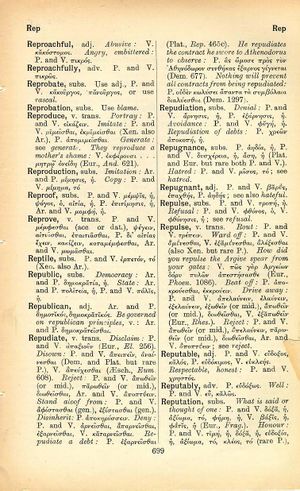reprove: Difference between revisions
From LSJ
ἀμήχανον δὲ παντὸς ἀνδρὸς ἐκμαθεῖν ψυχήν τε καὶ φρόνημα καὶ γνώμην, πρὶν ἂν ἀρχαῖς τε καὶ νόμοισιν ἐντριβὴς φανῇ → hard it is to learn the mind of any mortal or the heart, 'till he be tried in chief authority | it is impossible to know fully any man's character, will, or judgment, until he has been proved by the test of rule and law-giving
(CSV4) |
m (Woodhouse1 replacement) |
||
| Line 1: | Line 1: | ||
{{Woodhouse1 | {{Woodhouse1 | ||
|Text=[[File:woodhouse_699.jpg|thumb|link={{filepath:woodhouse_699.jpg}}]] | |Text=[[File:woodhouse_699.jpg|thumb|link={{filepath:woodhouse_699.jpg}}]] | ||
P. and V. μέμφεσθαι (acc. or dat.), ψέγειν, αἰτιᾶσθαι, ἐπαιτιᾶσθαι, P. | ===verb transitive=== | ||
[[prose|P.]] and [[verse|V.]] [[μέμφεσθαι]]; (acc. or dat.), [[ψέγειν]], [[αἰτιᾶσθαι]], [[ἐπαιτιᾶσθαι]], [[prose|P.]] [[δι' αἰτίας ἔχειν]], [[κακίζειν]], [[καταμέμφεσθαι]], [[Aristophanes|Ar.]] and [[verse|V.]] [[μωμᾶσθαι]]. | |||
}} | }} | ||
Revision as of 09:16, 20 May 2020
English > Greek (Woodhouse)
verb transitive
P. and V. μέμφεσθαι; (acc. or dat.), ψέγειν, αἰτιᾶσθαι, ἐπαιτιᾶσθαι, P. δι' αἰτίας ἔχειν, κακίζειν, καταμέμφεσθαι, Ar. and V. μωμᾶσθαι.

